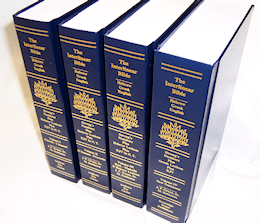Textus Receptus Bibles
Jay P. Green's Literal Translation 1993
| 40:1 | The word which was to from Jehovah, after Nebu-zaradan, the chief of the executioners, had sent him from Ramah, when he had taken him (and he was bound in chains, among all the captives of Jerusalem and Judah being exiled to Babylon). |
| 40:2 | And the chief of the executioners took and said to him, Jehovah your God has spoken this evil against this place. |
| 40:3 | And Jehovah has brought it and has done according as He has spoken, because you have sinned and have not obeyed His voice, even this thing has come upon you. |
| 40:4 | And now, behold! I set you free today from the chains on your hand. If it is good in your eyes to come with me into Babylon, come. And I will set my eye on you. But if it is evil in your eyes to come with me into Babylon, stay. Behold, all the land is before you, to go to the good and to the right in your eyes. Go there, |
| 40:5 | even while he had not yet returned, or go back to Gedaliah the son of Ahikam, the son of Shaphan, whom the king of Babylon has appointed over the cities of Judah, and live with him among the people. Or to all that is right in your eyes to go, go. And the chief of the executioners gave him ration and a reward, and sent him away. |
| 40:6 | And went to Gedaliah the son of Ahikam at Mizpah, and he lived with him among the people remaining in the land. |
| 40:7 | And when all the commanders of the army who were in the field, they and their men, heard that the king of Babylon had appointed Gedaliah, the son of Ahikam, over the land, and had appointed with him men, and women, and children, and of the poor of the land, of those who were not exiled to Babylon, |
| 40:8 | then they came to Gedaliah, to Mizpah, even Ishmael, the son of Nethaniah, and Johanan and Jonathan, the sons of Kareah, and Seraiah the son of Tanhumeth, and the sons of Ephai of Netopha, and Jezaniah the son of the Maachathite, they and their men. |
| 40:9 | And Gedaliah, the son of Ahikam, the son of Shaphan, swore to them and to their men, saying, Do not fear to serve the Chaldeans. Live in the land, and serve the king of Babylon, and it shall be well with you. |
| 40:10 | As for me, behold, I will live at Mizpah to stand before the Chaldeans who have come to us. But you, go gather wine, and the harvest, and oil, and put them in your vessels, and live in your cities that you have taken. |
| 40:11 | And when all the Jews in Moab, and among the sons of Ammon, and in Edom, and in all the lands, heard that the king of Babylon had left a remnant of Judah, and that he had set over them Gedaliah, the son of Ahikam, the son of Shaphan, |
| 40:12 | even all the Jews returned out of all places where they were driven, and came to the land of Judah, to Gedaliah, to Mizpah, and gathered wine and summer fruits in great abundance. |
| 40:13 | And Johanan, the son of Kareah, and all the commanders of the army that were in the field, came to Gedaliah, to Mizpah. |
| 40:14 | And they said to him, You certainly know that Baalis, the king of the sons of Ammon, has sent Ishmael, the son of Nethaniah, to strike your soul. But Gedaliah, the son of Ahikam, did not believe them. |
| 40:15 | And Johanan, the son of Kareah, spoke to Gedaliah in Mispah secretly, saying, Please let me go, and I will strike Ishmael, the son of Nethaniah, and a man shall not know. Why should he strike your soul, and all the Jews who are gathered to you be scattered, and the remnant of Judah perish? |
| 40:16 | But Gedaliah, the son of Ahikam, said to Johanan, the son of Kareah, You shall not do this thing. For you speak falsely concerning Ishmael. |

Green's Literal Translation 1993
Green's Literal Translation (Literal Translation of the Holy Bible - LITV), is a translation of the Bible by Jay P. Green, Sr., first published in 1985. The LITV takes a literal, formal equivalence approach to translation. The Masoretic Text is used as the Hebrew basis for the Old Testament, and the Textus Receptus is used as the Greek basis for the New Testament.
Green's Literal Translation (LITV). Copyright 1993
by Jay P. Green Sr.
All rights reserved. Jay P. Green Sr.,
Lafayette, IN. U.S.A. 47903.